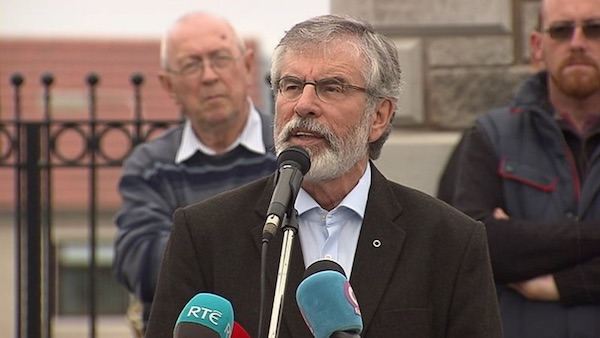
Gerry Adams has said efforts to rescue the political institutions in the north of Ireland are struggling because unionist leaders have not adapted to a rights-based society.
Speaking in Armagh, the Sinn Fein president pointed out that unionists once described Stormont as “a Protestant parliament for a Protestant state”.
He insisted his party was committed to making the ongoing negotiations work and to restoring power-sharing ahead of a deadline next week.
He warned the British government had “no investment” in the talks process and had “no affinity with it”. He also accused 26 County Taoiseach Leo Varadkar of trying to “wash his hands of the North” and said it felt like the former Fine Gael leader, avowed unionist John Bruton, was back in power.
The Sinn Fein leader said the political impasse could be overcome only by the DUP and his party working together.
“That will present many challenges for us. It also presents problems for the DUP leadership,” he said.
“What we need to do collectively is to accept that a rights-based society is in everyone’s interest. Moving to that position given that their leaders used to boast that they had a Protestant parliament and a Protestant state, is very difficult for political unionism.
“But on the other hand it is self-evident that this is no longer a Protestant state. And the notion of a Protestant parliament should never have been acceptable. No thoughtful unionist really believes that this would ever be acceptable in these modern times.”
Mr Adams added that Arlene Foster’s party must recognise “that they can only be in political office on the basis of a modern political dispensation bedded in equality and fairness”.
He continued: “In other words, they have to treat the rest of us as equals and we have to treat them as equals. Is the DUP leadership up for this? We will know soon enough.”
The talks are facing an uphill battle. The Stormont Assembly, long paralysed by unionism’s veto over political change, has in recent years become the focus of cross-community outrage over corruption, cronyism and unexplained handouts to politicians.
Sinn Fein, meanwhile, has strongly criticised the British Direct Ruler for refusing to meet groups such as the joint parliamentary body on the implementation of the Good Friday Agreement or Irish language rights groups, while engaging with unionist groups such as the Orange Order. Mr Adams said James Brokenshire had been “less than helpful”.
Sinn Fein negotiator Conor Murphy said he expected the two governments to circulate a framework deal to coincide with the expected intensification of the negotiations. However, he warned that any paper tabled by London and Dublin was likely to fall short of what was required.
Mr Murphy also accused both governments of trying to maintain a divide-and-conquer agenda against Sinn Fein through disinformation - a reference to claims last week that a bid by ‘moderate’ Michelle O’Neill to break the deadlock had been overruled by Sinn Fein ‘hardliners’ in the south.
Mr Adams has insisted an agreement can be reached in the Stormont talks on the restoration of powersharing if the DUP agrees to treat everybody as equals.
“Can we get that? Yes we can, but only if the DUP enters into the era of modern political democratic norms,” he told RTE television.
“We’re here to do a deal with the DUP, there’s no other reason for us engaging in these talks, we have to get a deal that’s based on the rights of citizens. This isn’t about making new agreements, this is about the implementation and delivery of an agreement which is already made.”
Mr Adams said there wasn’t a row between his party and the DUP. “I have to correct the impression that there’s been some sort of a row, if it wasn’t serious the deal would have been done before this.
“Why hasn’t a deal been done? A deal hasn’t been done because the DUP thus far are not prepared to embrace the rights-based agenda which has already been agreed in other times, and what we need is a delivery of all these commitments.
“Can a deal be done? Yes, of course a deal can be done. We’ve been locked into talks with the DUP at different times. Michelle O’Neill is meeting all the other parties here today, not just the DUP.
“What we need is very clear signals from the two governments that the rights which are available everywhere else in these islands, including Britain, should be available to here.
“Why can’t people who live in the North have the same rights as people who live in the South, or because we’re part of the British state, why can’t we have the same rights that people enjoy in England, Scotland and Wales?
“This was agreed 10 years ago, this was part of the St Andrew’s Agreement, the governments are obliged to bring it in. There is a Scots Gaelic Act, a Welsh language Act, there’s an Act na Gaeilge in the southern jurisdiction. We need to have one here.
“There’s no clever plan by Sinn Fein to bring down the institutions or anything else.
“[Late former Sinn Fein deputy first minister of Northern Ireland] Martin McGuinness served in office with three DUP leaders and it’s a sign of his frustration that he wasn’t getting the respect and more importantly people in the LGBT community, people in the Irish language community, people in ethnic communities were not getting the respect that they deserve.”
Mr Adams said he does not want to see this phase of the talks exhausted.
“The only reason we’re here is so we can get the rights that we’re entitled to under various agreements and which people enjoy everywhere else in these islands.”
![[Irish Republican News]](https://republican-news.org/graphics/title_gifs/rn.gif)
![[Irish Republican News]](https://republican-news.org/graphics/title_gifs/harp.gif)

